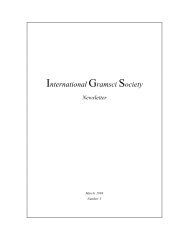Create successful ePaper yourself
Turn your PDF publications into a flip-book with our unique Google optimized e-Paper software.
that globalisation is not just a matter of fact about which we can do nothing; it is a political struggle that involveswinning our consent, and is yet to be resolved."Frank Rosengarten. “Conferring on <strong>Gramsci</strong>” in Rethinking Marxism, vol. 11, no. 1(1999), pp. 113-119A review of the international conference held in Cagliari in Cagliari in April 1997 to mark he sixtieth anniversary of<strong>Gramsci</strong>'s death and of the first Congress of the <strong>International</strong> <strong>Gramsci</strong> <strong>Society</strong> held in Naples in October 1997.Tibor Szabó. “<strong>Gramsci</strong> konferencia Nápolyban” in the bulletin of the HungarianPhilosophical <strong>Society</strong>, A Magyar Filozófiai Társaság Hírek, 1998, no.1; pp. 34-35.Of related interest:Gerry Groot (Center for Asian Studies, Univerity of Adelaide, Australia) is the author of thedoctoral thesis: Managing Transitions: The Chinese Communist Party's United FrontWork, Minor Parties and Groups, Hegemony and Corporatism.ABSTRACT:This dissertation examines the history and roles of China's minor parties and groups (MPGs) in the ChineseCommunist Party's (CCP) united front between the 1930s and 1990s using Antonio <strong>Gramsci</strong>'s principles for thewinning and maintaining of hegemony. <strong>Gramsci</strong> advocated a "war of position," the building of political alliances toisolate existing state powers and win consent for revolutionary rule and transform society. Intellectuals wereparticularly valuable allies and the MPGs were parties of intellectuals. Between 1935 and 1949, the CCP used theMPGs and their ideological influence to help isolate the Nationalists politically.After 1949, the united front worked for China's socialist transformation of the means of production andideology. To overcome recurrent crises caused by its methods, the CCP instituted concessionary "passive revolution"measures including united front and MPG work to win back the support of intellectuals. Yet the re-stating of someMPG third road political positions contributed to the anti-Rightist campaign of 1957. The failure of the subsequentGreat Leap Forward forced the CCP to adopt passive revolutionary methods again and the MPGs were revived duringthe Second Hundred Flowers period. They officially dissolved in 1966.The post-Mao, post-Cultural Revolution revival of the MPGs as part of a new united front was again partof a passive revolutionary strategy to rebuild CCP hegemony. The MPGs were needed initially for their connectionsto old society intellectuals with technical, managerial and other skills. The MPGs also acted to re-legitimise thesegroups and to represent them politically. The corporatist forms of the MPGs, have, however led repeatedly tointernal problems and dysfunctions inherent in corporatist structures. The CCP has used these problems as a meansof control. Economic reform is now creating new socio-economic groups and the CCP is adjusting the united frontand the MPGs to co-opt their representatives and deliberately forestall the evolution of an autonomous civil societyand middle class which could challenge CCP rule. This has resulted in a new and expanding role for the united front,the MPGs and organisations representing the new interest groups.— 41 —



